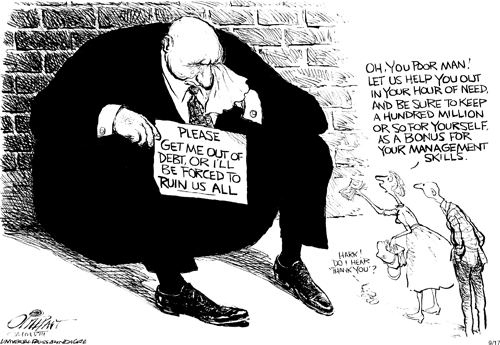The Rescue bill is, in my opinion, a major determinant of our generations’ future financial lives. Now that it is unchangeable and in action, it is the appropriate time to explore the techniques and solutions it proposes to fix the economy. The bill designed a new office in the Treasury that is meant to deal solely with the financial stability of our country called the Office of Financial Stability. This office holds the power to purchase problematic assets from banks and take other necessary measures to rehabilitate the economy. However, in order to regulate the Office of Financial Stability the Rescue bill made it a requirement that the Office must initially get their financial spending approved once it surpasses the $250 billion mark. Due to the lack of regulation of Wall Street and other influencers on our economy, Congress is making it imperative that there is total regulation of all financial influencers; thus, Congress established and “Oversight Committee” that is responsible for helping and watching over the Office of Financial Stability.
Now, let’s take a look at who the Rescue bill mostly plans to affect:
1) 400,000 homeowners on the brink of losing their homes to foreclosure
2) First-time house buyers who cannot afford to put a down payment on a home
3) States and cities that will receive money to restore foreclosed homes
4) Mortgage counseling for those uninformed
5) Fannie Mae and Freddie Mac
While those who are going to profit from the bill are fortunate, some critics analyze the small amount of benefits in comparison to the large sum of money being used in this bill. John Vogel, a business professor at Dartmouth, said “We’re not getting enough for our money…it will not address the problem as fully as we would have liked.” While economists partly agree with critics’ such as Vogel’s views on the Rescue bill, experts also note that this is just a small step in the long journey to repairing our economy—this is the most we can do for now.
Before this post comes to an end today, I want to touch on the subject of the economy’s affects on YOU and YOUR student loans. Education is a very important factor in becoming a successful American, and without the aid of student loans many students are unable to graduate or even attend a university. The Senate made sure that the Rescue Bill addressed the subject of student loans when the issue surfaced on September 17, 2008. The Senate guaranteed that the Rescue bill contained a section that endeavors to provide student loans for students in the years 2009 and 2010. (THANK YOU SENATE!)
That is all for now ya’ll, but stay posted for information regarding the Rescue bill at work in our economy and the Presidential candidates’ plans to rehabilitate our economy.


3 comments:
Merritt,
There can't be an ideal proposal developed in just weeks and I agree with economists that although this bill is not perfect, it is a small step towards fixing the economy. But the economy will not be fixed over night or even over years. According to history, after 20 years or so will the economy recover and maximize itself. These rushed bills are only a means towards short term success which is the very root of this entire economic mess. Hopefully this bill will prove otherwise; a long term effecting bill. Do you believe this bill is the right start in helping the U.S. and essentially global economy?
Merritt,
I cannot believe that the Rescue Bill actually created a new Treasury office. Why did this bill require a new office in the first place? Speaking of the office, the new "Oversight Committee" was a nice addition to keep this new office's spending in check, but why are these new government branches being created? Why not use existing divisions of government to perform these duties?
Finally, with these new offices, why is the Rescue Bill having a depreciated effect?
Tommy
Merritt,
You said in your blog that the government is going to give individual states certain amounts of money. Is any particular state going to get a heavy dose of help from the government? Is any state in more need than other states?
Post a Comment